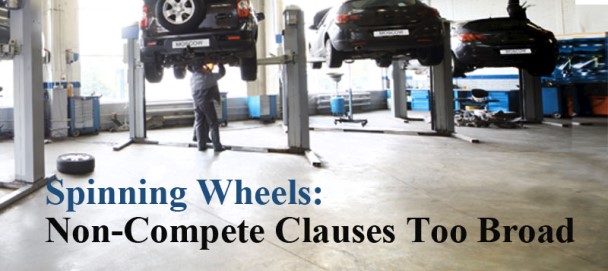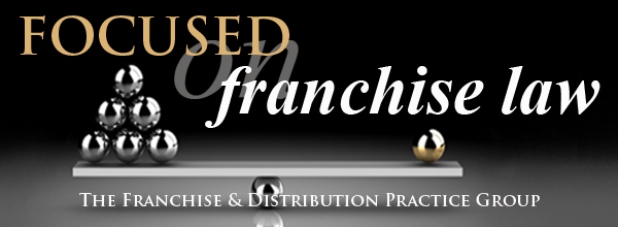Protecting Interests in Preliminary Injunctions; & The Purposes and Limits of Non-Compete Clauses

bkurtz@lewitthackman.com
dgurnick@lewitthackman.com
tgrinblat@lewitthackman.com
swolf@lewitthackman.com
msoroky@lewitthackman.com
kwallman@lewitthackman.com
tvernon@lewitthackman.com
March 2016
Tal Grinblat in Valley Lawyer
The ever-pervasive Happy Birthday to You – sung by waiters in corporate restaurants around the world to embarrassed celebrants and diners – may now reside in the public domain…”
Click to read: Music Publisher Caught in Birthday Suit, Agrees to Settle by Tal Grinblat and Nicholas Kanter
FRANCHISOR 101:
Protecting Interests in Preliminary Injunctions

 A franchisor in a termination dispute with a franchisee may request a preliminary injunction to force the franchisee to immediately stop operating the franchised business and using the franchisor’s trademarks and intellectual property. A court will grant a preliminary injunction when the party asking for it can show that it is likely to succeed on the claim and that, without an injunction, the party will suffer irreparable harm. Recently some franchisors have had difficulty obtaining preliminary injunctions. Courts have clarified when they will and will not grant injunctions in a franchise context.
A franchisor in a termination dispute with a franchisee may request a preliminary injunction to force the franchisee to immediately stop operating the franchised business and using the franchisor’s trademarks and intellectual property. A court will grant a preliminary injunction when the party asking for it can show that it is likely to succeed on the claim and that, without an injunction, the party will suffer irreparable harm. Recently some franchisors have had difficulty obtaining preliminary injunctions. Courts have clarified when they will and will not grant injunctions in a franchise context.
In 7-Eleven, Inc. v. Sodhi, 7-Eleven issued termination notices to a franchisee because the net worth of five of his locations fell below amounts required by the franchise agreements. The franchisee disputed that he breached the franchise agreements, so he continued to operate despite receiving the notices. 7-Eleven sued the franchisee for trademark infringement and asked the court for a preliminary injunction.
The court found that several factors calling for an injunction were satisfied, including a likelihood that 7-Eleven would succeed in its claim. However, it also found that 7-Eleven did not prove exactly what irreparable harm it would suffer to its reputation or property from temporary continuation of the stores’ operation. 7-Eleven submitted evidence of customer complaints on lack of cleanliness. But the court found those insufficient to show harm to reputation, in part because 7-Eleven received them before the franchisee’s breach. The complaints did not prove the franchisee’s continued operation was causing new harm to 7-Eleven’s reputation that hadn’t already occurred. The court declined the injunction.
In Intelligent Office System, LLC v. Virtualink Canada, Ltd., Intelligent Office System (IOS) entered into a Master License Agreement (MLA) with Virtualink Canada, Ltd. (Virtualink). The agreement granted Virtualink the exclusive right to license IOS’s trademarks and business concept (for “virtual offices”) to subfranchisees in Canada. In March 2013, IOS sent Virtualink a notice of defaults that Virtualink committed, including not meeting sales and opening goals and not providing reports and tax returns. IOS claimed Virtualink continued committing defaults, until IOS sent Virtualink a termination notice in October 2015. IOS filed suit in December 2015 and shortly after sought a preliminary injunction to shut Virtualink down.
The Colorado court noted that the purpose of a preliminary injunction is to maintain the positions of the parties until a trial could be held. So any preliminary injunction that would change the parties’ positions would be disfavored and scrutinized carefully. The court reasoned that forcing Virtualink to stop the business it had run would change the parties’ positions that existed in which Virtualink had been the “Master Licensee” for Canada. In declining to grant an injunction the court explained that IOS failed to show that it would be irreparably harmed without an injunction, since for years Virtualink had committed the defaults IOS claimed it wanted to stop, yet IOS allowed them to continue.
Both IOS and 7-Eleven show that a franchisor must act quickly and show urgency in response to franchisee defaults or courts may be unsympathetic when an injunction is requested. This can result in a franchisee receiving a notice of termination and yet continuing to operate the franchised business, possibly for years to come.
Click to read: 7-Eleven, Inc. v. Karamjeet Sodhi or Intelligent Office System, LLC v. Virtualink Canada, Ltd.
FRANCHISEE 101:
Purposes and Limits of Non-Compete Clauses

Many franchise agreements have “non-compete clauses”, which state that after termination or expiration of the franchise agreement, the ex-franchisee may not operate a business that is similar to or that would compete with the franchised business. These clauses apply for a stated time and cover a stated geography. In some jurisdictions, such as California, non-compete clauses are not enforceable. In other jurisdictions where these clauses can possibly be enforced, courts also decline to enforce them in some circumstances.
In AAMCO Transmissions, Inc. v. Romano, Robert and Linda Romano sold their AAMCO franchise in Florida and terminated their AAMCO franchise agreement. Then they opened a new transmission repair shop over 90 miles away from their old location. The Romanos’ franchise agreement had a non-compete clause barring them, for two years, from opening a competing business within 10 miles of any AAMCO location. The Romanos’ new location was only 1.4 miles from an AAMCO business. Despite this, a court refused to enforce the non-compete provision. The court ruled that the provision was too broad in its geographic scope, and limited enforcement to 10 miles from the franchisees’ former location, and 10 miles from any other AAMCO location within the county in Florida where the franchise had been located.
In MEDIchair LP v. DME Medequip Inc., MEDIchair franchise businesses sold and leased medical equipment to be used at home. The MEDIchair franchisor also owned and operated similar businesses, but under the name “Motion Specialties.” A MEDIchair franchisee in Ontario, Canada discovered it was competing with a nearby Motion Specialties store serving the same area. When the franchisee’s franchise agreement ended, it de-identified its store as a MEDIchair franchise, and operated a similar business in the same location, with the same employees selling the same or similar products. MEDIchair then sued the franchisee to enforce the non-compete clause in the franchise agreement. That clause prohibited the franchisee from operating a competing business within 30 miles of the franchised location or any other MEDIchair franchise for 18 months after expiration of the agreement.
The Ontario court noted that, to be enforceable, a non-compete clause must serve a legitimate business interest of the franchisor – namely, to protect the franchise system. In this case, the evidence suggested the franchisor did not seek a replacement franchisee for the vacated location, since the territory was already served by its own Motion Specialties location. MEDIchair’s actions showed that it had no interest in protecting the interests of its franchise system in Ontario. Therefore, the court refused to enforce the non-compete clause against the former franchisee in that territory.
AAMCO and MEDIchair show that even in jurisdictions where non-competes can be enforced, courts may narrowly construe the franchisor’s legitimate business interests that may be protected by a non-compete clause. A court may find, as in AAMCO, that the non-compete only protects the franchisor’s interests in the particular franchised location sold. Or, as in MEDIchair, a court may conclude that the franchisor has no business interest to protect – or, that the interest it seeks to protect is not “legitimate.”
Read: AAMCO v. Robert V. Romano and Linda Romano, and MEDIchair LLP v. DME Medequip Inc.
